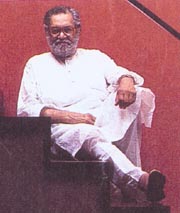|
So Far
A
Travellers Archive
Gerson
da Cunha
Photographs
|
A Traveller's Archive
By ARUNDHATI SUBRAMANIAM
IT'S tempting to be dismissive of poetry authored
by someone who seems to have spent much of his life doing something
else-and doing it exceptionally well.
And when the poetry is published at a time when mainstream publishing
in India shows no signs of a serious poetry agenda, one feels justified
in concluding that extra-literary considerations have clinched the
issue. (Those considerations, one infers, are particularly weighty
when the person in question happens to be a distinguished name in
Indian advertising and theatre.) |
 |
But there are occasions when things refuse to adhere to such
a perfectly reasonable scheme of poetic justice. Gerson da Cunha's
book of poems, SoFar, is one of them. There is nothing flamboyant
about this book-no dazzling displays of technical virtuosity, no
pathbreakingly experimental creative sensibility. In fact, the book
evokes none of the rhapsodic expletives that so often set dust jackets
ablaze.
What emerges instead, despite all one's misgivings, is a remarkably
restrained, unostentatious book of poems. The voice is quiet, the
craft graceful, the style minimalist, and the tone urbane but never
oily, confident but never brash, poised but never affected.
It is, in fact, a book of poems written by someone who doesn't have
anything to prove-neither a canon to gun down, nor any desperate
need to flaunt his literary credentials. It is this understated
assurance that makes the book refreshingly readable.
So Far is essentially a traveler's archive. From Mozambique to Mumbai,
Peru to Pachmarhi, the contexts out of which the poems arise are
bewilderingly diverse. But this isn't simple 'Kodak moment' poetry
either.
Instead of a series of baroque vignettes of exotic locales, you
get what appears to be the genuine cosmopolitanism of someone who
isn't just out to display the stamped pages of his passport. There
is a reflective quality in da Cunha's work, that blend of inner
and outer weather that one always seeks in poetry-an ability to
refract the world around without turning pat or pontifical. Nor
do the distancing effects of reflection turn this into the work
of a detached ironist. Despite the sparseness of the poetry, there
is warmth too-the warmth of engagement with the world-and a need
to make sense of places and people without easy recourse to sentiment,
pastiche or glib profundity.
Perhaps one of the most striking qualities of this poetry is the
ease with which it lends itself to the spoken voice-attributable
perhaps in part to the author's long involvement with the stage.
Consider, for instance, the easy conversational elegance of 'Hotel
Garcia, Recife': "An unsuitable place really. Glaring and shadowed/wrong
whatever it does like an actress at fifty."
Da Cunha is at his best in poems that distil specific moments in
a few uncluttered strokes. A delicate sense of exactitude evokes
Mumbai in a single line: "hot from home/tin lunches clatter out/under
a Gothic arch." Goa is a place where the ferry waits "panting, diesel
voiced/with priest and chickens/' while Gholvad is where "chikoos
wear earth colors with an old nobility".
The poems that seem less successful are the few that are weighed
down by generalities. There is a self-conscious programmatic edge
in the poem, In the New World Slum, for example. In Bahrain, an
overly schematic poem, the alliteration trips too easily off the
tongue: "the crime of Cain/provoked a prevalence of prophets/in
these parts..."
And yet, in a poem like Witness to a Demolition, the particular
and the general are orchestrated to a state of fine-tuned equipoise.
The note of elegy at the changing landscape of the metropolis combines
with an awareness of the 'power and nostalgia' that fashioned the
old world.
So Far is a book with several poems you would like to return to-not
least for the fact that they embody the realization that poetic
truth is more often to be found in a ripple than a splash. |
0 U T L 0 0 K
* August 21,2000 73
|

